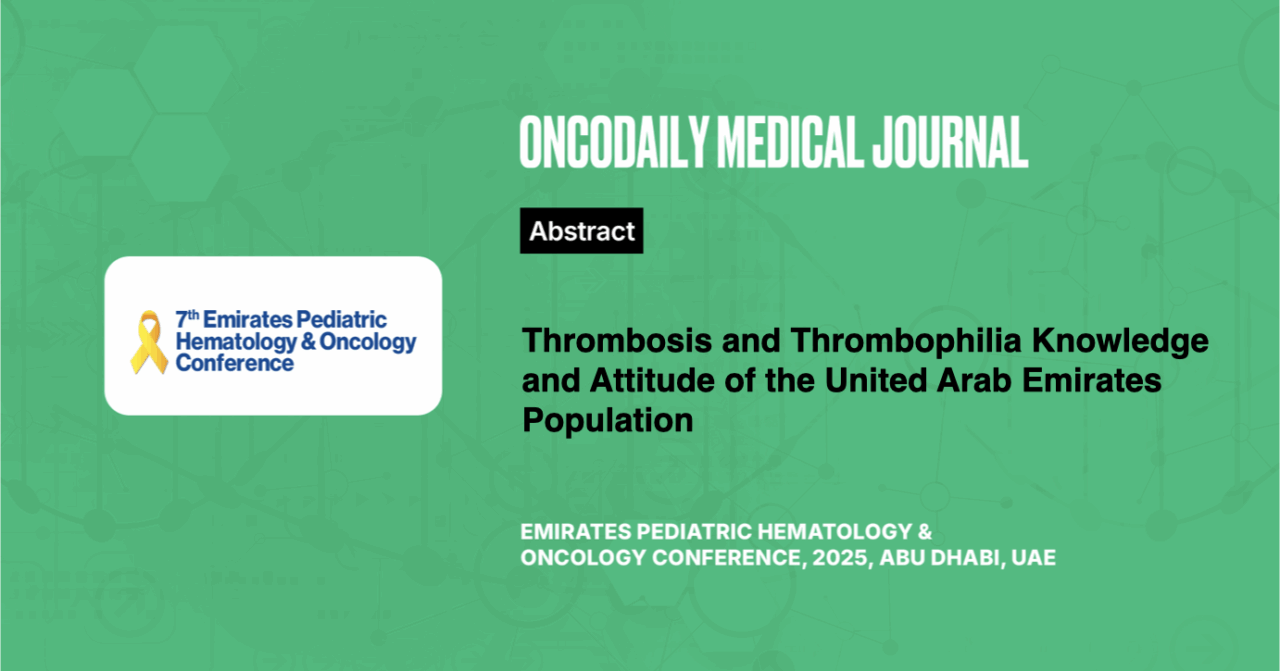Thrombosis and Thrombophilia Knowledge and Attitude of the United Arab Emirates Population
Abstract
Background: Venous Thromboembolism(VTE) is a preventable condition that has largely gone unnoticed as it continues causing significant morbidity and mortality worldwide annually(1). No studies assessing thrombophilia’s knowledge while inconsistent thrombosis findings were observed in the literature(2).
Objectives: Determine knowledge, and attitude towards thrombosis/thrombophilia among the UAE population.
Methodology: A quantitative, descriptive cross-sectional design using online-based survey was employed. Participants of both genders, of different nationalities, aged≥18 years, and from all UAE cities were included. Survey content was validated by thrombosis/thrombophilia experts, translated to Arabic, and pilot-tested. Survey included close-ended questions; 16-demographic, 13 assessing knowledge, and 22 evaluating attitude. All stat analysis was conducted using SPSS, Version-24-2018. P-value of <0.05% was statistically significant. Data was collected after receiving ethical approval from HCT.
Results: (974) out of (1040) participants were included in the study. Age ranged [18-76]; with mean 27.06 years. Subjects were mainly females(82.2%;n=801), single(69%;n=681), Emirati(79.2%;n=771), bachelor’s degree holders(59.8%), unemployed(68.5%;n=667), and had low monthly income(0-5000AED)(68.7%;n=669). (58.2%;n=567) of participants had medical/health education background. Additionally, 95.2%;81.3%;93.1% had never, no family members/relatives, or no friends been diagnosed with thrombosis.
Similarly, 98.3%;95.6%;97%,were found for thrombophilia. Source of knowledge on Thrombosis/Thrombophila were mostly from Educational Institutes (18.5%) (16.6%), Media (17.1%) (13.3%), Healthcare Professionals (17.1%) (14.6%), Internet (12.8%) (9.1%), and Family/relatives (12.8%) (8.5%). Furthermore (82.1%;n=800) had negative attitude towards thrombosis/thrombophilia although (74.125%;n=593) stated that they had heard about thrombosis (p<.001). Whereas(17.1%;n=167) had neutral attitude, and only (0.7%) had positive attitude. Majority of participants with negative attitude were females (83%;n=664), single (68.375%;n= 547) (P<.001), bachelor’s degree holders(60.125%;n=481), and with no medical/health education background (56.75%;n=454).
This study demonstrated significantly poor awareness and knowledge towards risk factors, signs and symptoms, diagnosis, treatment and preventive measures of thrombosis. Similarly, a study conducted in KSA found that most participants had poor knowledge and awareness towards risk factors, signs, symptoms of DVT and PE(3). Another study conducted in Yemen showed that majority of hospitalized patients were unaware of VTE and were unable to recognize signs and symptoms of DVT and PE.
In contrast, a study from Canada by Saga et al. found that most hospitalized patients (81.2%) had good knowledge of both DVT and PE. Likewise, Konieczyńska et al reported that younger patients in the United States had good knowledge about VTE in general (Halboup et.al, 2022). No previous studies have been conducted to assess knowledge, awareness and attitude towards thrombophilia.
Conclusion: There was poor knowledge on risk factors, signs/symptoms, diagnosis, treatment, and preventive measures of Thrombosis/Thrombophila as well as negative attitude was demonstrated among UAE population. It’s recommended to organize more awareness campaigns by healthcare authorities/providers to enhance knowledge and promote public-awareness of highly-serious yet preventable thrombotic conditions.
Furthermore, more educational programs must be conducted to encourage positive attitude towards thrombosis/thrombophilia by improving population’s lifestyles/habits. Finally, it’s suggested to implement public genetic testing to help healthcare providers make better medical judgments and enhance preventative medicine.





